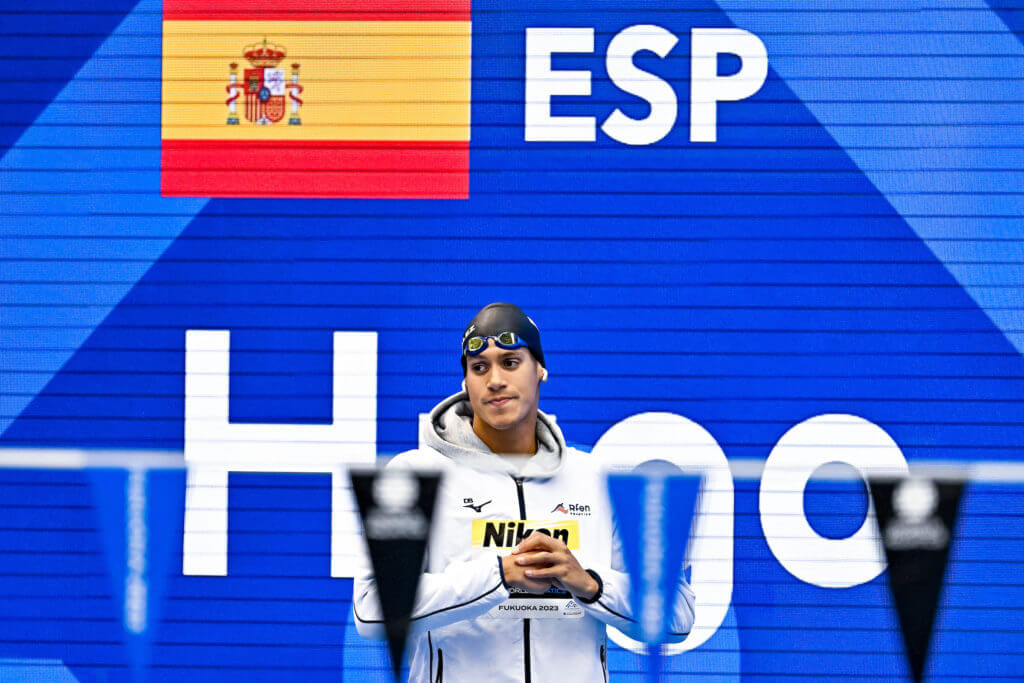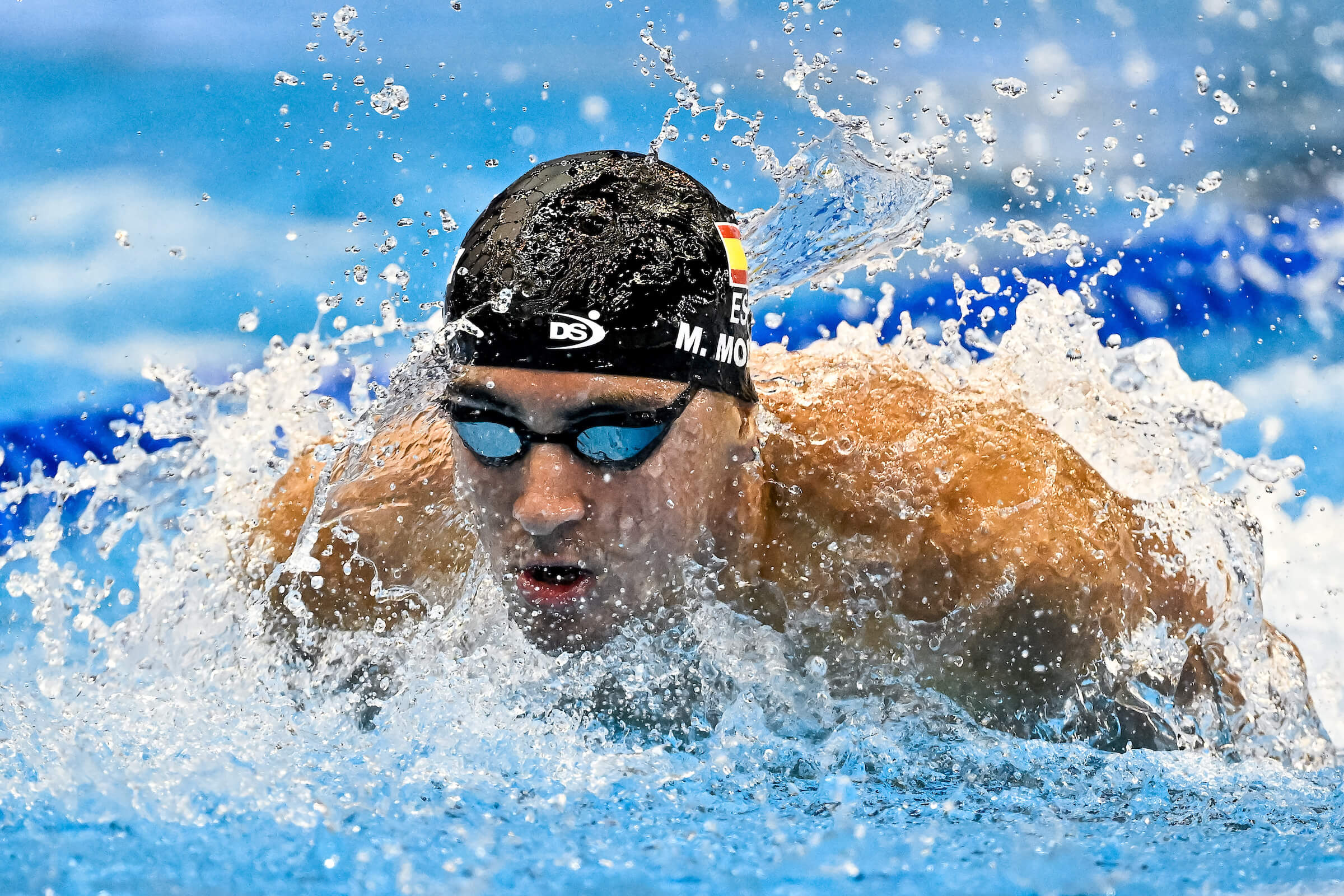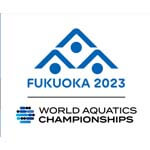Spain Relay Breakthrough at Worlds Points to Bright Days Ahead

Editorial content for the 2023 World Aquatics Championships is sponsored by FINIS, a longtime partner of Swimming World and leading innovator of suits, goggles and equipment. Spain Relay Breakthrough at Worlds Points to Bright Days Ahead Night 1 of the World Aquatics Championships brought a surprising name into finals that you may not have known was a surprise. With its swim in the men’s 400 freestyle relay, Spain qualified its first men’s relay for a World Championships final in this century. It’s evidence of what could be a burgeoning program, one getting a sizeable assist from the American college system and a famous name in the program’s past. The foursome of Sergio de Celis, Luis Dominguez, Mario Molla Yanes and Cesar Castro went 3:13.77 in prelims at Marine Messe Hall in Fukuoka, Japan, getting the sixth spot in prelims and eking into the final by .26 seconds. They would finish eighth at night, about a second slower. Even so, it marked significant progress for a program long a step behind the continental powers. “I feel like it’s been years since we’ve had a men’s relay,” said Hugo Gonzalez, one of the program’s leading lights. “For the last recent years, it’s been only women. It’s great to have relays.” Mario Molla Yanes; Photo Courtesy: Andrea Masini / Deepbluemedia / Insidefoto Spain’s recent swimming history on the men’s side is spotty, to say the least. No Spanish man has won a Worlds medal since 2009, when Rafael Munoz (in the 50 and 100 fly) and brief world record holder Aschwin Wildeboer (100 back) won bronzes. None has earned an Olympic medal since Martin Lopez-Zubero’s 200 backstroke win in home water at the Barcelona Games in 1992. (The program’s avatar for the last decade-plus was on the women’s side, in the form of four-time Olympic medalist Mireia Belmonte Garcia.) On the relay front, Spain made a big jump in 2022 when its 400 medley reached Worlds, finishing 12th. It was just the seventh Spanish men’s relay to make Worlds in the 12 editions dating back to 1998, a total of 39 opportunities. The last medley relay, in 2013, was disqualified, and the 800 free relay in 2015 was the only one of those to crack the top 10, in ninth. The Olympics have been no friendlier. Spain placed both free relays in the Rio Games in 2016 but hasn’t had a medley relay there since 2000. Its last men’s Olympic relay final was in 1972 in the 400 free. (The most recent medley finalist dates to 1968, and the last 800 free finalist goes back all the way to 1928.) There’s hope that such droughts could end soon. Spain set a pair of national records in the 400 free relay at the 2022 European Championships, with Carles Coll Marti anchoring in place of Castro. Gonzalez, Coll Marti, Alberto Lozano and de Celis comprised the medley relay in Budapest last year. In Fukuoka, all three relays got chances to swim. The men’s medley finished 14th. The 800 free placed 13th, the squad of Castro, Dominguez, De Celis and Carlos Quijada setting a national record of 7:10.85. Gonzalez personally had a tremendous meet. He was disappointed to miss out on finals in the 100 back in 11th, but he made the final eight in a pair of events, finishing seventh in the 200 IM and the 200 back. Molla Yanes tied for 10th in the 50 fly. Arbidel Gonzalez made semifinals of the 200 fly, setting a Spanish record of 1:54.99, which routed the mark set by Carlos Peralta in 2016 at 1:56.42. Having relays to swim at major international events has boosted the team dynamic. “It’s definitely great to fight for a team instead of just for yourself,” Hugo Gonzalez said. “The fact that we have four guys, maybe five, if we mix the freestylers with the medley guys, it’s great to have a team that can actually compete, make finals, fight for spots. I feel like that’s going to elevate the level of our national swimming and hopefully get to the point where we cannot just have relays but several guys advancing from prelims to semifinals to finals.” “I’m personally really thankful to swim with my friends,” Molla Yanes said. “ … We made history for our country last year in Rome (at Euros), last year in Australia (at Short-Course Worlds) and now. We didn’t achieve the national record, but we swam really good, and I’m so thankful.” Most of the program’s emerging stars train in the U.S. Hugo Gonzalez, already a two-time Olympian, won a pair of national titles with the University of California and won the 400 IM crown at NCAAs in 2022. Coll Marti, Molla Yanes and Dominguez swim at Virginia Tech under the guidance of Sergio Lopez Miro. (Hugo Gonzalez, who started his college career at Auburn, was to follow Lopez to Virginia Tech but reversed course in 2018.) Lopez’s swimming career was one of the last times that the Spanish were international medal contenders. He won bronze at the 1988 Olympics in Seoul in the 200 breast before a globe-trotting coaching career, at the likes of the Bolles School and now Virginia Tech. Lopez has brought his Spanish ties to Blacksburg, a move that’s been mutually beneficial. The Hokies finished ninth at NCAAs, the best finish in program history. That was thanks in large part to Youssef Ramadan winning the men’s 100 fly, the Hokies’ first national title. Coll Marti was named All-American for making the A final of the 200 breaststroke in seventh, while Dominguez and Coll Marti were on a pair of All-American and school record relays. The environments tend to feed on each other: Success for Spain driving Va Tech, and vice versa. “It’s so important,” Molla Yanes said. “Racing with your friends is the best thing you can do as a swimmer. It’s the thing that pushes you to the limit. I really notice when I’m swimming with my friends and when I’m not. Our national record, we did it with three guys swimming at VT and one guy who’s super close to us.”







